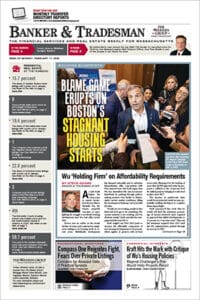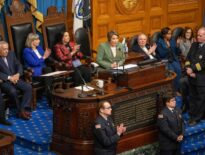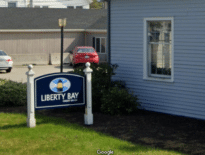
Gov. Maura Healey delivered her State of the Commonwealth Address in the House Chamber on Thursday, Jan. 16, 2025. Photo by Colin A. Young | State House News Service
For Gov. Maura Healey, 2025 is going to be about “implementation” – putting into practice the big housing, economic development and energy bills Beacon Hill passed last year.
“Now we’re going to implement — we’re going to lean in and implement,” she told legislators and guests at her annual State of the Commonwealth Address at the State House Thursday night.
Beyond a previously-floated proposal to follow New York City’s lead and ban renter-paid apartment broker fees when the landlord was the one hiring the broker, though, her speech avoided marquee new housing production proposals.
Massachusetts renters are often liable for the broker’s fee – usually the equivalent of a month’s rent – on top of security deposit, first month’s rent and last month’s rent, creating up to five-figure bills for renters when they move.
Most of the state’s major Realtor and landlord trade groups have already announced they support Healey’s proposal.
In addition to her proposed broker-fee ban, the governor touted the $5.16 billion in housing finance spending the Legislature granted her in the 2024 Affordable Homes Act. That bill also included a provision legalizing accessory dwelling units on most single-family lots statewide, which goes into effect next month.
The Affordable Homes Act’s funding will be distributed, mostly to affordable housing developments, over the next five years but limits in the state’s bonding ability mean it likely won’t be spent in its entirety, experts say. Even so, it will represent a significant expansion of state financing for housing developments.
She also praised the 116 out of 177 affected towns that have passed MBTA Communities law-compliant zoning.
“One hundred and sixteen towns have said yes to more homes, to more housing near transit. That means thousands of new homes are already in the pipeline. Let’s keep the momentum going,” Healey said. “If we want our kids to stay here, if we want families to put down roots, if we want seniors to be able to live in the towns they love – we need homes. So we’re going to build them.”
But the governor glossed over Tuesday’s stinging referendum defeat of an ambitious MBTA Communities zoning plan in Needham, a sign that the debate over liberalizing housing policy in Massachusetts is far from over.
The Needham plan would have brought around 2,500 new homes to the town’s commercial core over the next few decades, but it lost by a 60-40 margin.
Town officials there and in the roughly dozen other communities that have rejected MBTA Communities compliance plans now have six months to come into compliance, according to new state guidelines issued Tuesday.
In addition to housing topics, Healey’s speech focused on her proposal to spend $8 billion over 10 years on the state’s roads, bridges and public transportation networks. Much of that spending leans on greater-than-expected revenue from Massachusetts’ Fair Share Amendment surtax on incomes over $1 million.
It also includes provisions to close the MBTA’s looming $700 million operations budget gap and provide funding for some infrastructure projects.
Healey’s possibly loudest and longest applause line came when she lauded MBTA General Manager Phil Eng’s work to wipe out slow zones on the transit agency’s subway lines – “In Phil we trust,” she declared – and said the new transportation funding was needed so Eng and his management team could “keep cooking.”
In her speech, the governor also:
- Called for a new statewide high school graduation requirement to replace the MCAS test voters rejected in a statewide referendum in November.
- Proposed additional resources for community behavioral health centers.
- Steering more resources to primary care and workforce development efforts that can grow the ranks of the state’s primary care providers.






